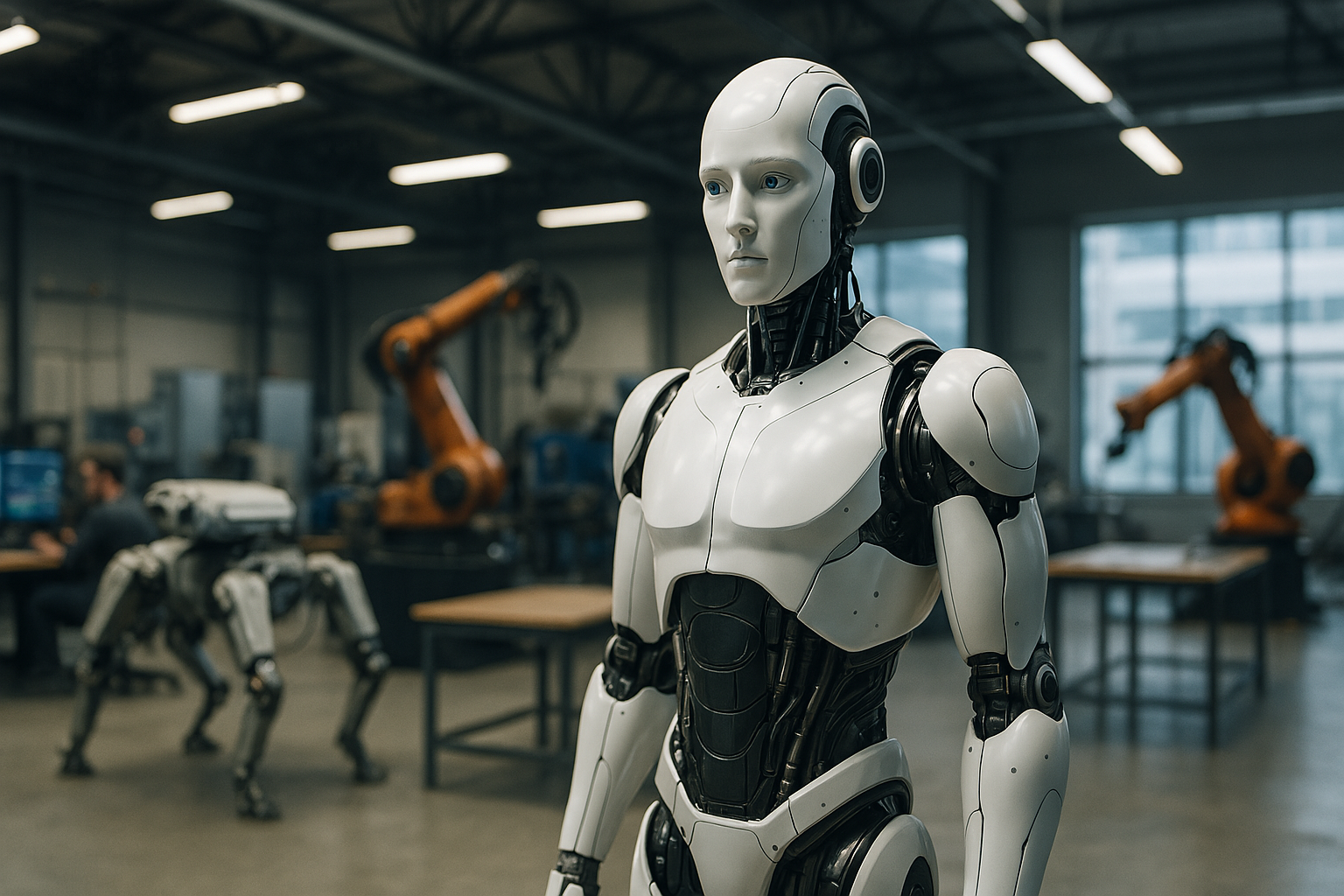DataKind is a global nonprofit that brings together data scientists, engineers, and strategists to tackle society’s most pressing challenges. Since its founding in 2012, DataKind has partnered with governments, NGOs, and enterprises to deliver scalable, data-driven solutions, accelerating the maturity of “Data for Good” worldwide.
The Intersection of AI and Robotics in 2025
Artificial intelligence and robotics are converging to reshape industries, economies, and daily life. As of 2025, the global AI-robotics market is valued at over USD 23 billion, with projections reaching USD 65 billion by 2029—an annual growth rate of 29.4%. Key trends include:
- Autonomous mobile robots (AMRs) for logistics and manufacturing
- Collaborative robots (cobots) that work alongside humans
- Robotics as a Service (RaaS) subscription models
- Humanoid robots for customer engagement and care
- AI-enabled perception and decision-making systems
These developments create vast opportunities for social impact when paired with data science expertise.
DataKind’s Three-Pronged Approach
DataKind’s methodology rests on three strategic pillars:
- Ecosystem Leadership Conducting research and opportunity analyses to identify high-impact avenues.
- Capacity Building Empowering partner organizations via training, tools, and community support.
- Technical Partnerships Co-designing ethical, scalable AI solutions with social impact stakeholders.
Within this framework, DataKind aligns its work to Sustainable Development Goals in domains such as frontline health, humanitarian action, climate and environment, and economic opportunity.
Core DataKind Products and Platforms
DataKind has developed a suite of open-source tools to democratize data-driven decision-making:
- Climate Finance Navigator: Interactive maps and analytics for tracking climate investments.
- Colandr: AI-assisted systematic literature review for evidence synthesis.
- Data Insights for Financial Inclusion Toolkit: Models to measure financial access.
- Data Observation Tool: Automated pipelines for real-time data monitoring.
- Economic Opportunity Datascape: Visualizations of labor and income metrics.
- Fenceline Data Analysis Tool: Geospatial dashboards for environmental justice.
- Foreclosure & Eviction Analysis: Risk indices to inform housing stability programs.
- Ladder Student Success Tool: Predictive analytics for education outcomes.
Each product offers a template for integrating AI insights with actionable interfaces, fostering evidence-based interventions.
Robotics and Humanitarian Action
In disaster response and humanitarian crises, robotics enhance reach and safety:
- Drone Reconnaissance Unmanned aerial vehicles capture high-resolution imagery for rapid damage assessment.
- Ground-based AMRs Autonomous robots deliver medicine and supplies in areas inaccessible by humans.
- Search-and-Rescue Cobots Collaborative robots assist first responders in rubble clearance and victim extraction.
DataKind’s role is to analyze sensor data, optimize flight and navigation paths, and forecast resource needs—amplifying the effectiveness of robotic assets.
Agriculture, Climate, and Environmental Robotics
Agricultural robotics combats food insecurity while conserving resources:
- Precision Intervention AI-guided agribots apply water, fertilizer, and pesticides only where needed, reducing waste.
- Crop Health Monitoring Machine learning interprets drone imagery to detect early signs of disease and stress.
- Autonomous Harvesting Mobile robots identify ripe produce and perform delicate picking tasks.
DataKind leverages climate and soil data within the Climate Finance Navigator and Datascape frameworks to inform robotic scheduling, ensuring optimal planting and harvesting windows for smallholder farmers.
Frontline Health: Medical and Assistive Robotics
The integration of AI and robotics in healthcare has yielded:
- Surgical Robotics High-precision robotic arms execute minimally invasive procedures guided by AI diagnostics.
- Telepresence Cobots Remote-controlled robots facilitate doctor-patient interactions in underserved regions.
- Elderly Care Assistants Companion robots monitor movement patterns, medication adherence, and vital signs.
Through partnerships with health NGOs, DataKind applies its Frontline Health data to refine AI models that drive robotic decision-making—reducing errors, anticipating supply shortages, and personalizing patient care.
Building a Data Infrastructure for Robotics
Robotics projects generate vast time-series, image, and geospatial datasets. DataKind’s Data Observation Tool and Playbook provide:
- Standardized ingestion pipelines for sensor feeds.
- Metadata schemas that ensure interoperability.
- Best practices for annotation and model training.
- Ethical frameworks for data governance and privacy.
These resources underpin robust AI systems in robotics, enabling reproducibility and transparent performance evaluation.
DataKind’s Community and Capacity-Building Initiatives
DataKind’s global volunteer network brings analytics expertise to robotic research labs, municipalities, and social enterprises. Key programs include:
- DataDives: Intensive weekend sprints pairing data experts with robotics teams to prototype solutions.
- Summer of Data Science: Internship cohorts embedding at robotics startups to co-build data-driven features.
- Workshops & Webinars: Training on integrating AI with ROS (Robot Operating System) and sensor fusion techniques.
By lowering the barrier to entry, DataKind democratizes access to advanced analytics for robotics practitioners in low-resource settings.
Partnerships at the Nexus of AI, Robotics, and Social Good
DataKind collaborates with leading AI and robotics stakeholders:
- Partnership on AI: Founding partner shaping ethical AI and robotics standards since 2018.
- Tech Corporations: Microsoft, Google, and Mastercard support DataKind programs, co-developing AI models with robotics applicability.
- Robotics Vendors: Pilot projects with cobot manufacturers to integrate predictive maintenance analytics.
- Academic Labs: Joint research on AI-enhanced perception for search-and-rescue robots.
These alliances foster cross-pollination between data science communities and hardware innovators.
Case Study: Fenceline Monitoring with Autonomous Sensors
In collaboration with environmental justice groups, DataKind developed a fenceline monitoring system where:
- Deployable AMRs traverse refinery perimeters, collecting air-quality readings.
- Real-time Data Feeds stream to DataKind’s Data Observation Tool, triggering alerts for hazardous thresholds.
- Predictive Models forecast pollution spikes, guiding robotic sampling missions and community advisories.
This integration of robotics, AI, and data science empowers at-risk populations to advocate for cleaner air and informed regulatory action.
The DataKind Playbook and Data-Recipes-AI for Robotics
DataKind’s Playbook codifies step-by-step guidance for data-for-good projects, including robotics applications. Complementing this, the data-recipes-ai repository provides:
- Reusable Code Modules for data extraction, transformation, and sensor fusion.
- Recipe Server Architecture enabling LLM-powered analytics on live robotic data.
- Semantic Search to retrieve proven pipelines for common robotics tasks.
These resources accelerate project kick-off, fostering rigorous, reviewable workflows for AI-driven robotics initiatives.
Future Directions: Scaling AI and Robotics for Equity
Looking ahead, DataKind aims to:
- Expand capacity-building in underserved regions to integrate low-cost robotics and data analytics.
- Co-design RaaS models that bundle AI, sensor hardware, and maintenance for nonprofits.
- Advocate for open standards in robotics data, ensuring accessibility and cross-platform collaboration.
- Leverage generative AI to automate code generation for ROS and sensor interfaces.
By amplifying the synergy between data science, AI, and robotics, DataKind fortifies solutions that are not only technologically advanced but also socially equitable.
Conclusion
DataKind stands at the vanguard of “Data for Good,” seamlessly weaving together AI methodologies and robotics capabilities for transformational social impact. Through strategic partnerships, open-source platforms, and a global community of data practitioners, DataKind empowers organizations—from health clinics to smallholder farms—to harness the predictive power of data and the physical reach of robotics. As the AI-robotics frontier accelerates, DataKind’s holistic approach ensures that technological innovation uplifts communities, fosters environmental stewardship, and advances human welfare worldwide.
References
- “Artificial Intelligence and Robotics Report 2025”. StartUs Insights, 12 Jan. 2025.
- “Future of AI in Robotics: Trends and Predictions for 2025”. Analytics Insight, 21 Aug. 2024.
- “2025 Robotics Predictions: Industry Leaders Vary on Impact of Humanoids, AI in Near Future”. Robotics 24/7, 31 Dec. 2024.
- “DataKind”. DataKind, 2025.
- “Our Approach”. DataKind, 2025.
- “The DataKind Playbook”. data.org, n.d.
- “GitHub – datakind/data-recipes-ai”. GitHub, n.d.
- “DataKind”. Partnership on AI, 2025.
Get the URCA Newsletter
Subscribe to receive updates, stories, and insights from the Universal Robot Consortium Advocates — news on ethical robotics, AI, and technology in action.


Leave a Reply